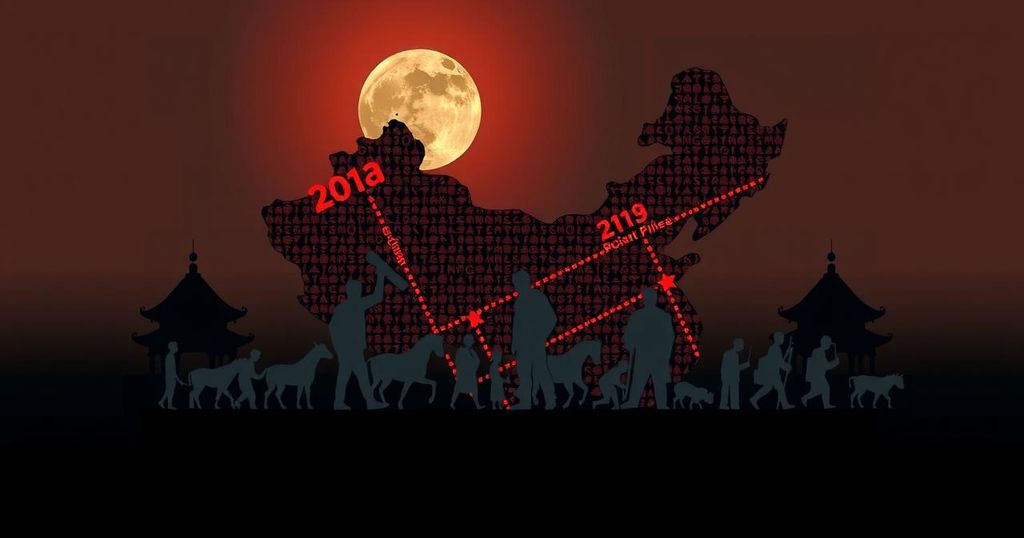Candidates in U.S. Politics Leverage Anti-China Sentiment Amidst Rising Tensions
As China’s influence expands globally, candidates in the United States have increasingly utilized the nation’s unpopularity as a point of attack against one another. Allegations range from dark suggestions that one candidate was groomed as a spy by Chinese leaders in his youth, to accusations directed at another contender regarding profits gained from a Chinese fentanyl manufacturer. Furthermore, there are claims linked to a candidate’s past involvement with selling Chinese-made SUVs through his car dealership.
Political consultant Whit Ayres remarked, “China is not exactly wildly popular among Americans these days, with prevalent perceptions of intellectual theft and disregard for international norms.”
Historically, critiques of China have been a staple in American political discourse. Former President Donald Trump, for instance, emphasized a tough stance on China through tariffs during his 2016 campaign. This sentiment has been reflected in sentiments across both Republican and Democratic platforms, particularly in relation to job outsourcing concerns prevalent in manufacturing-heavy regions of the Rust Belt.
In the context of increasing geopolitical tensions, various candidates have engaged in prolonged exchanges regarding their respective connections to China. The AdImpact database indicates that 171 political ads mentioning China have been aired during this election cycle. Notably, there are indications that Democratic candidates are beginning to focus more on this topic compared to previous election cycles where Republicans predominantly led the charge against China. During the 2020 election, 82 percent of Senate campaign ads referencing China were funded by Republicans, whereas, in the current cycle, Democrats have funded the majority of such ads, with Republicans accounting for only 36 percent.
The political backdrop permits ads to resonate with voters’ genuine fears regarding a more assertive China under President Xi Jinping. Heightened military activities and geopolitical maneuvers on China’s part—especially towards U.S. allies like Taiwan and the Philippines—further exacerbate these concerns. Allegations of intellectual property theft, environmental violations, and the influx of inexpensive Chinese goods threaten U.S. economic stability, heightening bipartisan support in Congress for measures aimed at countering China’s developments.
However, some of the attacks against candidates suggest a conspiratorial undertone reminiscent of Cold War anxieties regarding espionage. For example, unfounded insinuations suggest that Tim Walz, the running mate of Vice President Kamala Harris, might be a Chinese spy due to his extensive travel to China for both personal and political reasons. Congressman James Comer and Senator JD Vance have publicly questioned Walz’s affiliations, albeit with no substantiating evidence.
In response, Walz’s spokesperson highlighted the candidate’s history of advocating for human rights and democracy while countering misleading assertions, stating, “Throughout his career, Governor Walz has prioritized American jobs and industries while standing against the [Chinese Communist Party].”
On a broader scale, ongoing negative advertisements about China suggest that future Congressional sessions may adopt even more adversarial approaches to U.S.-China relations, as voter sentiments increasingly skew toward skepticism of the latter. This unfavorable perspective toward China has intensified since 2017, peaking after the COVID-19 pandemic, with approximately 80 percent of Americans reporting a negative opinion of the country, according to a Gallup poll.
Some legislators express concern over the implications of targeting China’s actions versus unfairly casting blame on all individuals of Chinese descent. A surge in hate crimes against Asian Americans in the wake of the pandemic underscores this worry.
The political landscape showcases fierce competition in key Senate races, especially among vulnerable Democrats in Midwestern districts. Blasting Republican opposition over their alleged ties to China serves as a critical strategy in swaying Republican-leaning voters. In Pennsylvania, Senator Bob Casey has run aggressive advertisements against his opponent, Dave McCormick, emphasizing McCormick’s investments in China during his tenure at a hedge fund. McCormick, however, contests these allegations, clarifying that he never invested in illegal Chinese fentanyl manufacturers.
Similarly, in Michigan’s Senate race, candidates have pointed fingers at each other regarding their Chinese affiliations. Representative Elissa Slotkin criticized her rival, Mike Rogers, claiming he aided Chinese enterprises’ access to U.S. markets, a statement that has been disputed for its veracity. Rogers, in turn, has labeled Slotkin as “Shanghai Slotkin,” manipulating her connections with a Chinese electric vehicle manufacturer to undermine her credibility in China-related discourse.
In Ohio, Bernie Moreno positioned himself against the perceived threat of China, while incumbent Senator Sherrod Brown highlighted the issue of outsourcing American automotive jobs to Chinese companies.
In summary, the politically charged environment reveals a significant trend where candidates leverage fears concerning China to bolster support, often leading to a more contentious and potentially hazardous narrative that could extend beyond the political arena into social dynamics involving Chinese Americans. While countering China’s negative influence remains a topic of bipartisan agreement, navigating the fine line between legitimate critique of foreign policy and fostering xenophobia presents a complex challenge for practitioners in the political landscape.
The increasing frequency of these advertisements and allegations will likely shape electoral strategies and legislative actions in the future as candidates strive to position themselves favorably amid public concerns regarding U.S.-China relations.








Post Comment